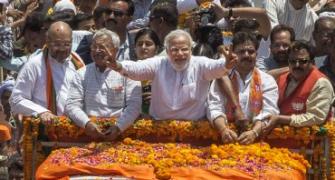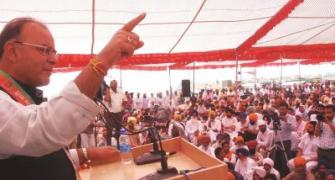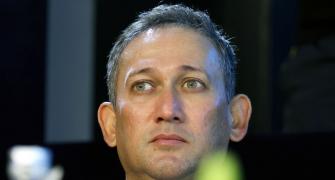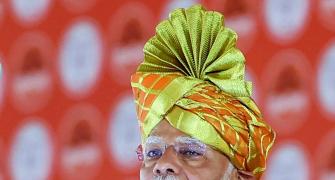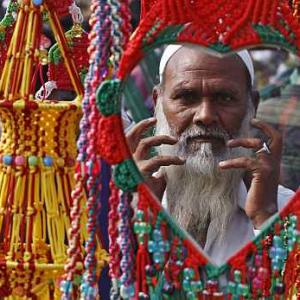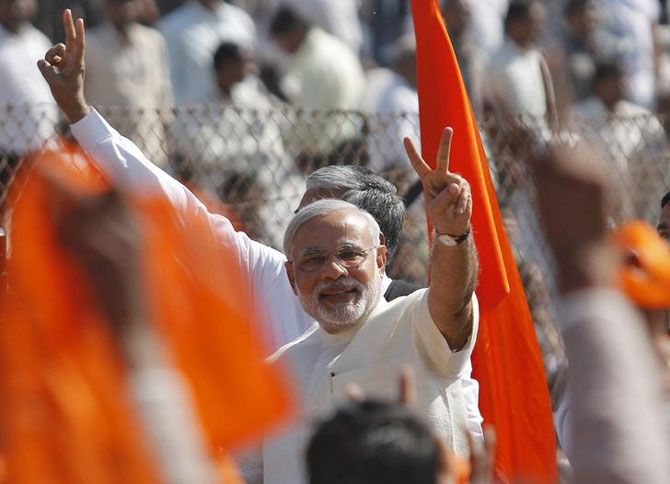 'A change of government will bring about a lot of changes because everything is frozen for the last two years. So, the frozen energies of India will be released.'
'A change of government will bring about a lot of changes because everything is frozen for the last two years. So, the frozen energies of India will be released.'
Swadeshi Jagran Manch convenor Swaminathan Gurumurthy discusses the Modi phenomenon with Shobha Warrier/Rediff.com
- The first part of the interview: 'Manmohan Singh knows very little of the Indian economy'
Iut it is very important to have a stable government and a strong leader at the Centre...
My feeling is any government that comes in cannot be like the UPA (United Progressive Alliance) government. Even though one party had a very large share in power, it became dysfunctional. You cannot say because of coalition partners, they had trouble.
We have a $337 billion current accounts deficit in nine years while the previous NDA (National Democratic Alliance) left with $20 billion surplus. After 1978, only in 2002-2003, 2003-2004, we had a current account surplus. Between 1950 and 2002, we had current account surplus only in four years; 1976-1977, 1977-1978, 2002-2003, 2003-23004.
Subsequently, the UPA government incurred a current account deficit of $337 billion! That shows a complete inability to oversee the economy. They should be seeing what is going to happen in the next six months or one year, as today's communication system has perfected it.
The political chaos became economic chaos functionally.
Where should the thrust be for the next government so that the economy starts growing?
The thrust should be on manufacturing. That means you have to have control over imports and India has to go for anti-dumping. India used to be one of the most active anti-dumping laws till 2003-2004, after America.
Without using anti-dumping, you can't face currency manipulation. They were for free trade and they didn't want bad relations with other countries. You have to have bad relations if you want to save your country; you can't be goody-goody.
What we had was geo-political failure, policy failure, and functional failure.
In fact, I would like a separate study to be made to know how mal-governance affected the Indian economy, for future governments to be alerted about this.
I am not talking about a commission of inquiry but a proper study by a political economic research institute so that this should not be repeated. It should be some kind of a white paper, but not with the government hand or politics in it.
After manufacturing, which sector needs immediate attention?
If you take care for manufacturing, a very large area of services sector associated with it also can be activated.
The first thing I would do is to prevent foreign investment into real estate. Foreign investment has completely frozen Indian real estate. If any government asks my advice, I will say, stop investment from outside India in real estate for another five years.
All political parties are talking about creating 100 million or 10 million jobs.
How are you going to do it is the most important thing. Unless you take care of the productive service sector like construction, hotel industry, automobile, etc jobs are not going to be there.
What about agriculture?
Agriculture requires a long term approach. By 2061, more than 60 crore (600 million) people are going to be in the villages. India is not going to be an urban lead economy. So you need a short term, medium and long term strategy. Look at the way a government that is on its way out is allowing field trials of genetically modified crops.
How do you look at the social welfare schemes like the MNREGA (Mahatma Gandhi National Rural Employment Guarantee Act), subsidies, etc? How much are they really working in India?
What is supposed to work in times of depression, cannot work in times of boom. When the economy itself is working according to them, what is the need for such schemes? It is an admission that the boom has nothing to do with growth.
When you say you have 9.5 percent growth, why do you dole out money to people? That means your growth is not going to them.
Is it advisable or good for an economy to have such schemes?
It is not advisable. If it had been implemented in select 100 districts, it would have worked. Why do you implement this in states like Punjab, Haryana and Tamil Nadu -- some of the most prosperous parts of India?
You mean it is not sustainable?
It is not only sustainable, it is eroding the work culture of the people. When you can go and sign a register and get Rs 120 and you can work and get Rs 200, what will people prefer? How many people have assessed what people did under MNREGA? Much of the work is statistical.
Do you think it was implemented to get votes?
It is purely to get votes. In some areas, it may have worked, like dry areas where there was no water. But it is not needed for the whole of India.
Do you feel this election degraded to a very low level?
Absolutely. The idea is to stop Modi at all cost. So, you do everything for that. It is okay if you attack Modi or Rahul Gandhi on principles. But once one person degrades the campaign, there will be competitive degrading.
Somebody is asking questions about some girlfriend of Rahul Gandhi. Look at how ridiculous this election campaign has become.
This way, main issues get sidetracked. Unfortunately, the public develop a taste for trivia. Once you administer the steroid of trivia into public discourse, there will be no takers for serious things.
Do you think this is the worst election campaign we have witnessed?
I think so. I can see a parallel to 1971. When Indira Gandhi said Garibi Hatao, the Opposition said, Indira Hatao. At that time, personal attacks were there, but they were based on principles, like she was dictatorial, she has broken the party, etc but it was not about the person.
Here, they want to stop Modi at all cost and are throwing dirt at each other. That was not there even then.
Let us talk about the Gujarat model of development that Modi is talking everywhere. Till now, everybody including the World Bank used to talk about the Kerala model of development. How different are these two models?
There is a difference. According to me, there is no Kerala model of development. No state can outsource agriculture, but Kerala imports 75 percent of its food requirements. It used to produce 60 percent of its requirement till the 1960s.
If you make agriculture unviable, and convert agriculture into real estate, how can you call this a development model?
The Kerala model of development is a misnomer. Kerala requires the Middle-Eastern countries for its development, and this is the Kerala model of development. It is a remittance economy. Almost 20 percent of the remittance to India goes to Kerala. This is what sustains the Kerala economy, real estate, housing, social security, etc.
Primary education, primary health centres, etc were hailed as successful Kerala models...
I am not saying there were no positives. In literacy, Kerala has done very well. In gender ratio, Kerala has done very well. In health-care also, they have done well though the health habits of Keralites are very good.
It has been a homogenous society. But nothing new has been done there. What is the effect of the variables? No production, no agriculture.
How do you compare it with the Gujarat model?
Compared to Kerala, Gujarat has generated wealth, there is production there and it has not relied on remittance from outside. There is no comparison between the two models.
The Kerala model of development would have been very good if the people who go out of Kerala, are taught to use their skills to set up small units in Kerala. But money has only promoted consumerism and huge liquor sales.
The criticism against Modi is that he has helped only the capitalists...
If you say the Gujarat model of development was lead only by large industries, let me ask, what about the small scale units that flourish there?
Take the diamond industry, for example. 9 out 10 diamonds cut in the world are cut in Gujarat, and it is a cottage industry. This employs the largest segment of people.
How can you say Modi has helped only the big industries?
Look at the agriculture growth in Gujarat.
Because there were gas finds, large businesses in petroleum, etc came up. If you look at their contribution to the GDP of Gujarat, it is only minimal. Entrepreneurship in Gujarat is a very important factor for its growth.
Many say that Gujarat has prospered not because of Modi, but because Gujaratis are entrepreneurial in nature...
Because he ran a corruption-free government, entrepreneurship could grow. Why is the entrepreneurial talent of Tamil Nadu facing huge problems?
The same thing could have happened here also. Why did it not happen? The atmosphere that you create is very important for entrepreneurs to flourish.
Modi promises that he can replicate what he has achieved in Gujarat, across the entire country. Do you think it is possible as each state is different?
He created an administrative model in Gujarat. He created an atmospheric change. He created an attitudinal change. These things can be replicated everywhere. It depends on what is the business in a particular area.
Bengal bangles can be made only in Bengal, but if there is an atmospheric and attitudinal change, the Bengal bangle industry can become a global industry.
Can a central government achieve such changes in states?
What is the use of a Planning Commission then? What is the use of the National Development Council? You may have to have more coordination between the state and the Centre like Modi said the other day.
The central government should not dictate and it should be a bottom-up process. These are the initiatives he may bring about if he becomes the prime minister.
Will he be able to meet the expectations of the people? People hear about the growth in Gujarat and they expect him to change their lives too.
There will be a compulsion on him to perform.
How tough will it be for him?
It is tough, but my faith in Modi is, he is the only politician I know of, who would like to lay a place for himself in history. That ambition is very important. I don't think he would like to come back to power at any cost.
You take for example, the 2007 Gujarat elections. The Congress was giving free television and one rupee wheat etc. at that time, the media asked him what he was going to give.
He said I am going to send legal notice to all the tax defaulters and send them to jail. A man who is desperate to win the election will never do it.
He went and appealed to all the agriculturists that they better pay to get electricity. This is not just economics; this is aligning and co-opting the society into making economic policies. Are they not distinct models?
Do you think though he is not an economist, because he understands India, he will be able to deliver?
He understands Indian society. In 2011 January, there were huge demolitions of unauthorised constructions in Ahmedabad. In March or April was the local body election. So, many BJP (Bharatiya Janata Party) people were worried. I asked him, why are you demolishing when elections are round the corner?
He said the ordinary people must see that the government is acting against unauthorised constructions. That is more important than how many votes you get.
These are all distinct attitudes. Normal politicians would have said no controversy before the election. Here is a man who is willing to court controversy for a good cause.
These are all actually development models.
How much can a strong administrator like him help the economy grow?
He is seen as a determined and clean man. Mere determination and mere cleanliness is not enough. A determined, clean man can bring about changes. I don't think anyone can say, the man is not clean. That is an important factor that will guide economics.
Is it an uphill task for the next government to revive the economy?
I wouldn't call it an uphill task, but a difficult task. I think a change of government itself will bring about a lot of changes because everything is frozen for the last two years. So, the frozen energies of India will be released if there is a clear mandate.

